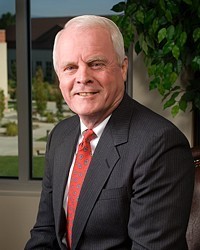 About a month ago, after 86 years of life, Johnny Kline died in Tennessee.
About a month ago, after 86 years of life, Johnny Kline died in Tennessee.
If you don’t know who Johnny was, you aren’t somehow deficient. He was famous, but not as an individual. He was part of a famous team. Johnny was once a Harlem Globetrotter.
If you never got the chance to see the Globetrotters back in the day, you really missed a treat. They were hilarious, talented and worked like a well-oiled basketball playing (and sometimes goofing off) machine. Individually, each man was a highly skilled black man, at a time in American history when opportunities for men of color were few and prejudice was even more bold than now. These men broke molds. They crashed through barriers. They made us laugh – but they did it as a team. People don’t recall each of the individuals, they think of them as one identity. That is what good teams produce.
 You might think team sports are exciting to watch, but it is much harder than it appears to coordinate a vibrant team! It was never easy to get people to work together well. Getting people to think in tandem, let alone work in tandem is very difficult.
You might think team sports are exciting to watch, but it is much harder than it appears to coordinate a vibrant team! It was never easy to get people to work together well. Getting people to think in tandem, let alone work in tandem is very difficult.
Did you ever see a team take on a group-oriented obstacle course? They include some very interesting group building exercises. On the better courses, there is a high wall over which each member must pass. They attempt to climb to the top of the wall, and toss their legs over the wall, and then descend the other side without getting hurt or getting hung up in the netting over the wall. Such obstacle courses offer teams a visual opportunity since dealing with obstacles is what a team must learn to do. These courses are all about building teamwork, and they can be very effective.
Today, we want to return to a discussion from Romans about living out our faith together. We want to think about teamwork while we look at Paul’s words to an ancient church that was “on mission.”
We have been studying Paul’s words and we have been looking closely at his teaching on how they should practically care for one another as team members. In Romans 15, his instruction includes a big idea about how to think as a team. In essence…
Key Principle: In Biblical terms, “I” don’t go to Heaven, “we” do.
Romans 15 isn’t about a new subject, but a continuation of the discussion Paul had from the previous chapter.
If you look back, you will note that he was already writing to them about stronger believers and weaker believers from the opening verse of the last chapter.
In Romans 14:1 he admonished the strong believers to invite into the fold the weaker, but to be careful with them as it regarded their convictions. Their ideas may not have been well-founded, but they were deep – and caring for them took precedent over some harsh form of “crash training.” It wasn’t that Paul wanted the weak to remain so; it was because he knew that people don’t care what you know until they know that you care about them.
The areas of conviction cited by Paul were two: consumption and celebration. Some believed consumption of certain things violated Biblical principles. They thought abstaining was the only godly response, and all who partook were of a lesser spiritual quality.
I find the verses comforting because the same tendency exists centuries later among believers. There have always been believers who defined spirituality by what they DON’T do, rather than intimacy with Jesus.
As we keep reading from this letter, we will also find another tendency that has traveled with the church down through the centuries – the tendency to think of Christianity in individual terms. Paul sought to make clear that in many respects Christianity is a team sport.
At the core of his teaching was a word to the strong believers of his time: Believers are intended to be intentional about progressing together as a team.
Look at the opening in Romans 15:
Romans 15:1 Now we who are strong ought to bear the weaknesses of those without strength and not just please ourselves.
The verse offered two instructions:
- First, the strong were to lift, bear and carry the weak who were unable to carry themselves.
- Second, the strong were to put their own pleasure behind the needs of those who needed their help.
Our faith is not a competitive race, where we each line up and launch out at the sound of a starting gun, breezing past one another in pursuit of Jesus. It is a team endeavor. We only win when we all break the tape together.
Baby Christians celebrate (rightfully) that Jesus saved THEM. They think in terms of their own growth… in the same way a physical CHILD does. The point is, believers must GROW UP.
The first growth point is when believers learn why “together” is important.
If you keep reading, it becomes readily apparent WHY the instruction was issued.
Romans 15:2 Each of us is to please his neighbor for his good, to his edification. 3 For even Christ did not please Himself; but as it is written, “The reproaches of those who reproached You fell on Me.” 4 For whatever was written in earlier times was written for our instruction, so that through perseverance and the encouragement of the Scriptures we might have hope.
Did you notice there were three reasons why this focus on the “other” was marked out as very important:
First, believers are commanded to seek to please our brother in a way that builds him up.
Second, believers are called to remember the example of our Savior. If Jesus put our needs first, we are to put the needs of others ahead of our own. We pale in comparison to His importance, and He did it willingly for us, and for the glory of His Father.
Third, believers must follow the pattern that was outlined for us in the Scriptures, in order to navigate this world successfully, applying well the Word that brings hope.
Don’t miss the caution here. It is easy for a believer to feel as though they have gained strength, and they are ready to “go it alone.” Individualism seems responsible, but our call is to slow down and bring those who cannot make it alone with us.
If we put other people before us, we demonstrate maturity and care. We act like Jesus. We model the lifestyle of someone who both HEARS the Word and LIVES the truths found in it.
At this point in the narrative, I can’t help feeling like Paul seemed to break into a song. I keep picturing in my head a musical praise interlude. He dropped in words of praise in verses five and six:
Romans 15:5 “Now may the God who gives perseverance and encouragement grant you to be of the same mind with one another according to Christ Jesus, 6 so that with one accord you may with one voice glorify the God and Father of our Lord Jesus Christ. “
Can’t you picture Paul stepping out of the scene on a stage and breaking into song?
It may take a moment to get past the “break out in praise” appearance of the passage (at least it did in my mind). Go on and you will grasp the underlying truth here…
Believers may gain most when “forward progress” seems least.
Did you notice how Paul shared that God gives perseverance? He also made the point that God gives encouragement. He even hints that God gives unity that leads to the blended sound of harmonious praise.
At the risk of sounding obvious, let me caution you about requesting perseverance from God. What generally builds muscle really hurts in the process.
At the same time, I think there is something more here. There are things that we cannot rush through in life.
I have a confession: I have a tendency to walk fast, and I find myself often having to stop and wait for Dottie to catch up. I don’t know why I do things quickly, but I am finished a plate of food before my wife has finished her first few bites. I walk quickly, I eat quickly – I live like I am in some kind of race to accomplish more. I honestly don’t know why. I have thought long and hard about it, but I just cannot understand where it comes from.
What I know is that it is an impulse that must be fought when I am with other people. There is no prize to the guy who finishes eating first at the banquet.
Think about Paul’s exclamation of praise for a moment. Take a moment to grab a truth. Essentially, when we make our faith about individualism, we rob it of its essence.
God intended the strong believer to focus attention on getting the weak over the wall with the rest of the team.
In a sense, the weak were a GIFT to the strong – because they forced the strong to slow down and help others who can’t get over the wall without assistance. The teamwork that results from the strong helping the weak is part of the design of the body of Christ.
At our core, we are to learn that getting there together is more important than getting there first. “I” don’t go to Heaven; “we” do. “I” don’t run the race;
“we” do.
Deeply rooted in the Christian life and experience is a team making its way through an obstacle course.
Have you ever considered how some of the best lessons come from hurting people in the grip of tough experiences, even when they aren’t getting the team to move ahead in profound ways?
Consider Mary’s story for a moment. In the book “It’s Not Fair” she wrote:
“While battling my first bout of non-Hodgkin’s lymphoma, my treatment was like rafting down an unknown river. As a Long Island gal, Billy Joel’s “River of Dreams” seemed to be the sound track of my life during that time. Despite the hair loss, chemo, and keeping an Excel spreadsheet of my kids’ schedules and sleepovers with friends and relatives, the lunacy of it all did not escape me. As I rode the rapids toward my bone marrow transplant, I could not get over the sheer comedy that comes from trying to live a typical life in such an atypical way. Morbid humor is truly something that must be embedded in one’s DNA, because it can seem really inappropriate at times. Not to mention, people really don’t know how to react or treat you when, well you know, you have no eyelashes, eyebrows, head hair, and just look like a freak.
In my case, nearly 100 percent of the time, most people, when totally surprised or unguarded, responded with kindness and genuine compassion.
This was most evident in two cases. My neighbor Jim, a sixty-five-year-old former Marine from the Greatest Generation, opened the door to find me in my gray hoodie, sloppy warm-up pants, scruffy sneakers, red bandana covering my cue ball head of no hair, red eyes from crying crying out of frustration, and a face mask. I had just waved good-bye to my children, who were being parceled out to loving friends for a few weeks as I prepared to go to Johns Hopkins for my transplant (twelve-week stay). Unfortunately I was locked out of my house. When Jim opened the door, his face went into shock. Without a word, his face clearly said, “I am being mugged in broad daylight by a druggie gang member!” Once I saw that he didn’t recognize me— why not?— I quickly said, “Hi, Jim, it’s me, Mary, from across the street, and I am locked out. Can you help me?” His demeanor changed in a nanosecond. Without skipping a heartbeat he said, “Oh, Mary, [cough, gulp], I am so sorry. I didn’t recognize you there. Must be these glasses [as he wiped them].” His graceful save made me smile, as did his breaking-and-entering skills using a credit card.
Not one week later, as I lay in my hospital bed, I felt another ripple of gallows humor. The female doctor, clearly practicing her bedside manner, sat on my bed, leaned in to tell me how my treatment was progressing, and the whole time had an angelic look and a purposeful calming cadence to her voice. All were useless. Once seated, I looked at her navy blue monogrammed name that was embroidered on her crisp white doctor’s coat— Dr. Maggot. Whatever she said, I couldn’t hear, as my insides were busting and I was trying ever so gallantly not to cry from laughter or pee my pants (bedpan optional). It made me wonder about so many things, most notably how a person with the name Maggot would go into medicine. When she asked if I had any questions, I fought the urge to spit out, “Have you ever thought of using an umlaut with your name?”
From that point forward, I knew that funny, illogical, and nonsensical stuff happens every day and will continue to be there even when you are thrust into a gushing river of unfair stuff. You just need to keep looking for it and finding it.
-From: Dale, Melanie (2016-08-16). It’s Not Fair: Learning to Love the Life You Didn’t Choose (Kindle Locations 286-288). Zondervan. Kindle Edition.
It was in the pain of another’s experience that we all heard the possibility of finding humor in the circumstances.
Maybe it isn’t clear to you, but the Bible teaches that we can move so fast, we rush past God’s best lessons…because they often come from weakened people. Look around the room. Those who may be weakest physically may be a special gift from God to all of us. Those who hurt are a treasure planted in this place to teach all of us important lessons. It isn’t all about speed and progress – it is about the whole team moving ahead in spite of the hurting.
They aren’t a problem; they are a blessing. They aren’t a distraction; they are an opportunity to put others first.
In a sense, slower progress can mean more God. No individual on the team may become a superstar in this scenario, but the whole team can become more healthy, more balanced and more secure when they learn to work together. Progress may be less dramatic, but it will be more lasting.
Believers will struggle with our differences – but that is part of the learning process.
Paul argued that because God intended us to pull together, both the weak and the strong, we must fight the pull to reject one another because of our differences. He wrote:
Romans 15:7 “Therefore, accept one another, just as Christ also accepted us to the glory of God.”
In short, Jesus accepted US – so we can learn to accept EACH OTHER.
When we consider what we are compared to Who He is, we see it clearly. We are flawed; standing beside the One Who is perfect. We are selfish; standing beside One Who gave His very life for those who mutinied. We are no bargain.
With the truth in mind that I am not a superstar, not the key to the future of the movement, not the greatest thing to happen to Christianity since Christ…. I can look with tenderness to the one who is struggling behind me to get over the wall. I can help them with their obstacle. It may slow me down, but the point is to get there together.
Paul drove home the point of acceptance by mentioning that Jesus accepted both Jew and Gentile, while he quietly called them to accept each other. He wrote:
Romans 15:8 For I say that Christ has become a servant to the circumcision on behalf of the truth of God to confirm the promises given to the fathers, 9 and for the Gentiles to glorify God for His mercy; as it is written, “Therefore I will give praise to You among the Gentiles, And I will sing to Your name.” 10 Again he says, “Rejoice, O Gentiles, with His people.” 11 And again, “Praise the Lord all you Gentiles, And let all the peoples praise Him.” 12 Again Isaiah says, “There shall come the root of Jesse, And He who arises to rule over the Gentiles, In Him shall the Gentiles hope.”
Jesus served the Jewish people and fulfilled the promises God made to their fathers. Yet, He also served the Gentiles and fulfilled some promises that were more cryptic, but nevertheless included in the Scriptures. The Savior DID the things God promised. He did them for all of us. He accepted both Jew and Gentile, and didn’t decide He would do for one what He would not do for the other.
Here is the truth: We see differences more easily than we see similarities. We pick out what distinguishes one person from another more often and more deeply than we attempt to see each other as the same. That won’t build a good team.
We all have days that fall apart. We all make mistakes. We are all wrestling dragons of our own making. We are all facing frailties that come with living in a fallen world. Stuff breaks on all of us. We could all use a decent dose of hope.
Did you notice the ending verse of our section sounds like Paul broke out in song again?
Romans 15:13 “Now may the God of hope fill you with all joy and peace in believing, so that you will abound in hope by the power of the Holy Spirit.”
A Few Words about Hope
I cannot leave the passage without mentioning that if you read the first thirteen verses of the chapter, you will note four times the word “hope” falls off the page (15:4,12 and twice in 15:13). Obviously, running beneath the teaching of the passage was another theme – God wanted to make plain how hope could change the Roman believers and where they could find it.
The Greek word for hope is “elpis” – taken from elpō, “to anticipate or welcome”). It means simply the “expectation of what is certain to happen.” It is used to denote how the experience of “pre-savoring” a taste as the dish you love is being plated in front of you, after you have snuck a taste from the serving tray.
Hope in the Bible is more than a glancing wish for the future – it is an expectation based on a taste of experience already attained.
Hope of Heaven is rooted in the taste of the Spirit – the presence of the Holy One in this life. Our hope is in the Lord Himself, and the expectation comes because we have, in some small way, already engaged Him in this life. What we expect in His arms is based on what we have received while touched by His Spirit.
Don’t overlook that in the text, there are four sources of hope found tucked within the passage:
First, there is the record of God’s work in the people of the Book. The Scriptures are designed to give us hope as we follow the contours of the lives of believers who went before – each with their own set of challenges and pains. The story isn’t about how good they were, but rather about how good God is in spite of how fickle they were. That should encourage us: Our future doesn’t depend on our ability to pull off life well.
Second, the promises found in the Scriptures were designed to bring us hope. We can gain important insights from the past, but hope is about a certain future. Paul grabbed four passages from the Bible to emphasize that God promised (and was now keeping His Word) to plunge those who followed Jesus from the Gentile world into an ocean of hope. He mentioned God doing it for Jews, but he drove it home repeatedly in the case of Gentiles, because it was something harder for the people to believe.
Third, hope comes from the presence of God Himself, as is clear in the first part of verse thirteen. The God of hope can fill you with resolute assurance and the sense that all things are coming to be what they should be as you trust Him more. That is the careful rendering of the verse.
Finally, hope is driven deep within by the powerful impact of the Holy Spirit. It grows by the Spirit’s expansion with you. The term “abound” in the end of verse thirteen demonstrates that hope is something the Spirit inflates inside of you by His own power, like a compressor fills a tire. Hope floods in and fills up space left uncomfortably empty by the assault of troubles.
Records, promises, the presence of God and the inflating work of His Spirit are all at work to fill us with hope – when we don’t fill our lives with fake answers, false memes and platitudes. When you need real hope, you need to come emptied to the One Who alone can offer it.
God’s Word, when lived, will birth hope within His people. The hope isn’t for one of us – it is for ALL OF US.
In Biblical terms, “I” don’t go to Heaven, “we” do.
Christianity isn’t an individual thing – it is a team thing. I am supposed to be heading toward the goal, arm in arm, with my team mates. This isn’t about ME as much as it is about US.
There are certainly aspects of my walk that are individual.
The yielding of my heart to Jesus is my responsibility. The authenticity of my desire to know and follow Jesus is a personal matter.
Yet, if I forget that is paired in the Word with the sense that I belong to others and they to me, I turn family into footrace and replace team with individual super-stardom. That isn’t the plan – it never was.
Think about your faith this way:
Play for the team and don’t hog the ball. You see, ball hogs don’t trust the team. They have an inflated view of themselves, and a cynical view of team mates.
Would you be offended if I noted that many Christians look like spiritual ball hogs?
























